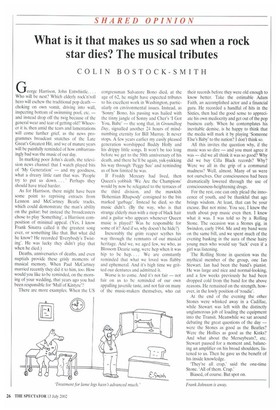What is it that makes us so sad when a rock star dies? The musical tributes
COLIN BOSTOC K-SMITH
George Harrison, John Entwhistle.. . . Who will be next? Which elderly rock'n'roll hero will eschew the traditional pop death — choking on own vomit, driving into wall, inspecting bottom of swimming pool, etc. — and instead drop off the twig because of the general wear and tear of getting old? Whoever it is, then amid the tears and lamentations will come further grief, as the news programmes broadcast snatches of the Late Great's Greatest Hit, and we of mature years will be painfully reminded of how embarrassingly bad was the music of our day.
In marking poor John's death, the television news channel that I watch played bits of 'My Generation' — and my goodness, what a dreary little rant that was. 'People try to put us down.. . . ' Perhaps they should have tried harder.
As for Harrison, there might have been some point to reprising extracts from Lennon and McCartney Beatle tracks, which could demonstrate the man's ability on the guitar; but instead the broadcasters chose to play 'Something', a Harrison composition of minimal appeal. (Yes, I know Frank Sinatra called it the greatest song ever, or something like that. But what did he know? He recorded 'Everybody's Twisting'. He was lucky they didn't play that when he died.) Deaths, anniversaries of deaths, and even nuptials provide these grisly moments of musical memory. When Paul McCartney married recently they did it to him, too. How would you like to be reminded, on the morning of your wedding, that years ago you had been responsible for 'Mull of Kintyre'?
There are more examples. When the US congressman Salvatore Bono died, at the age of 62, he might have expected tributes to his excellent work in Washington, particularly on environmental issues. Instead, as 'Sonny' Bono, his passing was hailed with the tinny jangle of Sonny and Chefs 'I Got You, Babe' — the song that, in Groundhog Day, signalled another 24 hours of mindnumbing eternity for Bill Murray. It never stops. A few years earlier my easily pleased generation worshipped Buddy Holly and his drippy little songs. It won't be too long before we get to the 50th anniversary of his death, and there he'll be again, yuk-yukking his way through 'Peggy Sue' and reminding us of how limited he was.
If Freddy Mercury had lived, then Queen's yobbish 'We Are the Champions' would by now be relegated to the terraces of the third division, and the mawkish 'Bohemian Rhapsody' consigned to the bin marked 'garbage'. Instead he died, so the music didn't. (By the way, who is that strange elderly man with a mop of black hair and a guitar who appears whenever Queen music is played? Was he responsible for some of it? And if so, why doesn't he hide?) Inexorably the grim reaper scythes his way through the remnants of our musical heritage. And we, we aged few, we who, as Blossom Deane sang, were hep when it was hip to be hep. . . . We are constantly reminded that what we loved was flabby and ephemeral. And it's high time we gritted our dentures and admitted it.
Worse is to come. And it's not fair — not fair on us to be reminded of our own appalling juvenile taste, and not fair on many of the music-makers themselves, who cut their records before they were old enough to know better. Take the estimable Adam Faith, an accomplished actor and a financial guru. He recorded a handful of hits in the Sixties, then had the good sense to appreciate his own mediocrity and get out of the pop business early. When he contemplates his inevitable demise, is he happy to think that the media will mark it by playing 'Someone Else's Baby' to the nation? I don't think so.
All this invites the question why, if the music was so dire — and you must agree it was — did we all think it was so good? Why did we buy Cilla Black records? Why? Were we all in the grip of a communal madness? Well, almost. Many of us were not ourselves. Our consciousness had been dramatically lowered through the use of consciousness-heightening drugs.
For the rest, one can only plead the innocence of youth, and be thankful that age brings wisdom. At least, that can be your excuse. But not mine. You see, I knew the truth about pop music even then. I knew what it was. I was told so by a Rolling Stone. The occasion was a Stones gig, in Swindon, early 1964. Me and my band were on the same bill, and we spent much of the evening basking in the aura of these hairy young men who would say 'fuck' even if a girl was listening.
The Rolling Stone in question was the mythical member of the group, one Ian Stewart. Ian had been the band's pianist. He was large and nice and normal-looking, and a few weeks previously he had been dropped cold from the band for the above reasons. He remained on the strength, however, in the lowly position of 'roadie'.
At the end of the evening the other Stones were whisked away in a Cadillac, while Stewart was left with the distinctly unglamorous job of loading the equipment into the Transit. Meanwhile we sat around debating the great questions of the day — were the Stones as good as the Beatles? Were the Hollies as good as the Kinks? And what about the Merseybeats?, etc. Stewart paused for a moment and, balancing an amplifier on his broad shoulders, listened to us. Then he gave us the benefit of his inside knowledge.
'They're all crap,' said the one-time Stone. 'All of them. Crap.'
Biased, of course. But spot on.
Frank Johnson is away.


































































 Previous page
Previous page